Fleurs du Mal Magazine


Or see the index
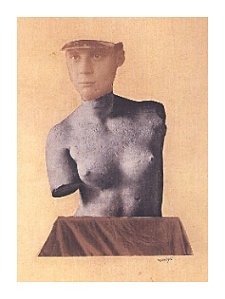
Johannes Theodor Baargeld
(1892-1927)
Du blickst befremdet auf die alten Spuren
Du blickst befremdet auf die alten Spuren
wo Du des immer Neuen Grund
gewähnt, und dich erschreckt der Fund,
und wieder blickst du auf den jungen Schnee der Fluren.
Doch du begreifst nicht, daß vor Jahresstund
du dich am selben Wegkreuz maßest,
und daß du schier ein Jahr vergaßest
und wie so stark sein könne ein zerbrochner Bund.
(1924)
Johannes Theodor Baargeld poetry
fleursdumal.nl magazine
More in: Archive A-B, Baargeld, Johannes Theodor, Dada
bert
bevers
Remedies tegen ongeloof
Toen hij nog klein was, was hij erg bang om zijn
haren te laten groeien omdat je met lange manen
als je niet uitkeek op je galopperend paard in takken
van een boom kon blijven hangen. Maar nu, op deze
Rogate, denkt hij in een doezeling van waarheid aan
de lichtheid van de biecht, aan het herhalingsgebod,
aan zijn weelderig ontbijt, aan de zwijgruimte van zijn
sacristie en aan het Requiem van Peter Benoit. Aan
die ijlte waarnaar sopranen je verheffen kunnen.
Bert Bevers
Ongepubliceerd, uit de reeks in wording Gedichten uit een stadje in de heuvels
fleursdumal.nl magazine
More in: Archive A-B, Bevers, Bert
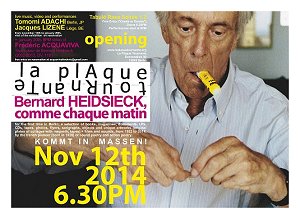 Bernard Heidsieck (1928 – 22 November 2014) a French sound poet was born in Paris.
Bernard Heidsieck (1928 – 22 November 2014) a French sound poet was born in Paris.
Apart from being a poet he was vice-president of the Banque Française du Commerce Extérieur in Paris and president of the Commission Poésie at the Centre National du Livre.
In the mid 50s Heidsieck started performing his Poèmes-Partitions pieces. He brought spoken word together with a wide range of recorded material. Bernard Heidsieck organised the first international festival of sound poetry in 1976 and later the event “Rencontres Internationales 1980 de poésie sonore” which took place in Rennes, in Le Havre and at the Pompidou Centre in Paris. He was also initiater of the journals Sound Poetry and Action Poetry.
Bibliographie
Sitôt dit, Seghers, 1955.
B2B3, Éditions du Castel Rose, 1967.
Encoconnage, avec Françoise Janicot, Guy Schraenen, 1972
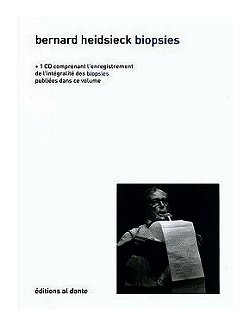 Portraits-Pétales, Guy Schraenen, 1973,
Portraits-Pétales, Guy Schraenen, 1973,
Foules, Guy Schraenen Éditeur, 1976 (Belgique).
D2 + D3Z, Poèmes-Partitions, Collection Où, Henri Chopin Éditeur, 1973.
Partition V, Le Soleil Noir, 1973 avec une œuvre de Ruth Francken.
Poésie action / Poésie sonore 1955-1975, Atelier Annick Le Moine, 1976.
Participation à Tanger I et Tanger II, Christian Bourgois Éditeur, 1978, 1979.
Dis-moi ton utopie, Éditions Eter, 1975.
Poésie sonore et caves romaines suivi de Poème-Partition D4P, Éditions Hundertmark, RFA, 1984.
Au-delà de la poésie, with Julien Blaine and Servin, with drawings by Jean Touzot, L’Unique, 1985
Canal Street, SEVIM/ B. Heidsieck, 1986
Poésie et dynamite (avec un texte de Jean-Jacques Lebel), Factotumbook 38, Sarenco-Strazzer, 1986
Derviche / Le Robert, Éditeurs Évidant, 1988.
Poème-Partition « A », Électre Éditeur, 1992.
D’un art à l’autre (Poésure et Peintrie), Ville de Marseille, 1993
Poème-Partition « R », Cahiers de nuit, Caen, 1994.
Poème-Partition « N », Les Petits classiques du grand pirate, 1995.
Sitôt dit, Seghers, 1995.
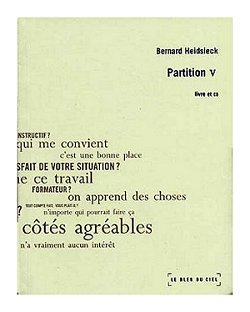 Coléoptères and Co, with P.A. Gette, Yéo Éditeur, Paris, 1997.
Coléoptères and Co, with P.A. Gette, Yéo Éditeur, Paris, 1997.
Poème-Partition « T », with a CD, Derrière la Salle de bains, 1998.
Vaduz, avec un CD, Francesco Conz Éditeur/Al Dante éditeur, 1998.
La Fin d’un millénaire, catalogue Ventabrun Art Contemporain, 2000
Poème-Partition « Q », Derrière la salle de bains, 1999 + une autre édition en 2001.
Bonne Année, avec Yoland Bresson, Éditions du toit, 1999
Respirations et brèves rencontres, with 3 CDs, Al Dante éditeur, 2000. (aussi en K7)
Affiche et bande magnétique, L’Affiche de poésie n°28, Le bleu du ciel, 2000
Nous étions bien peu en …, Onestar Press, 2001.
Partition V, with 1 CD, réédition, Le bleu du ciel, 2001
Canal Street, with 2 CDs, Al Dante éditeur, 2001.
Poème-Partition « F », with 1 CD, le corridor bleu, 2001. (aussi en K7)
Le carrefour de la chaussée d’Antin, with 2 CDs, Al Dante éditeur, 2001
Partition V, Le bleu du ciel, 2001 (2-9511615-3-0)
Notes convergentes, Al Dante Éditeur, 2001. (aussi en K7)
La poinçonneuse, with 1 CD, Al Dante éditeur, 2003.
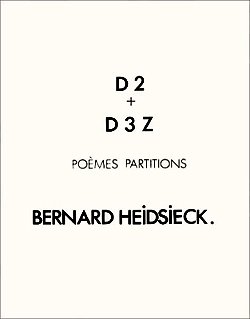 Ca ne sera pas long, fidel Anthelme X, 2003.(CD)
Ca ne sera pas long, fidel Anthelme X, 2003.(CD)
Lettre à Brion, CD, Al Dante Éditeur, 2004.
Derviche ; Le Robert, with 3 CDs, Al Dante éditeur, 2004.
Démocratie II, with 1 CD, Al Dante éditeur, 2004.
Heidsieck et Hubaut, (cassette) avec Joël Hubaut
Morceaux choisis supplément à Bernard Heidsieck Poésie Action, Jean-Michel Place, (CD)
Collages, L’Affiche de poésie n°42, Le bleu du ciel, 2006
P puissance B, avec Radio Taxi(c), Lotta Poetica and Studio Morra
« Trois biopsies » et « Un passe – partout »
Djerassi, collages et écritures manuscrites, Le bleu du ciel, 2009 (978-2-915232-57-82)
« Trois contre 1″, CD audio et CDROM, avec Joel Hubaut, Jean-François Bory, Julien Blaine ( TRACE LABEL, 1999 ref TRACE 009)
Tapuscrits – Poèmes-Partitions, Biopsies, Passe-Partout, Les Presses du réel, 2013
IN MEMORIAM BERNARD HEIDSIECK
fleursdumal.nl magazine
More in: #Archive A-Z Sound Poetry, #Archive Concrete & Visual Poetry, Archive G-H, EXPERIMENTAL POETRY, In Memoriam
Martin
Beversluis
Mijn eeuwige incarnatie
In een vorig leven was ik misthoorn
ik identificeerde rampen brulde
in twijfeldonker monosyllaben
tegen boeien en boten
ik gaf plaats aan
hier
nu ik dichter ben heb ik de dood
gevangen in een potvisprotocol
ik spring als in een computergame
van level naar level van leven naar leven
van de ene werkelijkheid in de andere
hier schrijf ik gedichten in gebarentaal
daar schiet ik voorbijgaand een bad guy neer
meer dan negen levens mij kun je niet raken
en mocht ik toevallig toch doodgaan
dan sta ik onmiddellijk weer op in een
volgend leven in een ander spel
altijd klaar die volgende strofe
te schrijven te dulden
te duiden en te brullen
ik ben hier
en ik zal de Boeddha maar niet vragen
hoeveel gedichten ik nog ga maken
eer ik verlichting bereik.
Martin Beversluis
fleursdumal.nl magazine
More in: Archive A-B, Beversluis, Martin
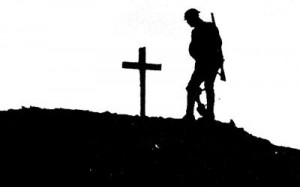
Alun Lewis
(1915 – 1944)
Postscript: For Gweno
If I should go away,
Beloved, do not say
‘He has forgotten me’.
For you abide,
A singing rib within my dreaming side;
You always stay.
And in the mad tormented valley
Where blood and hunger rally
And Death the wild beast is uncaught, untamed,
Our soul withstands the terror
And has its quiet honour
Among the glittering stars your voices named.
Alun Lewis poetry
fleursdumal.nl magazine
More in: Lewis, Alun, WAR & PEACE
Anna de Noailles
(1876-1933)
L’inquiet désir
Voici l’été encor, la chaleur, la clarté,
La renaissance simple et paisible des plantes,
Les matins vifs, les tièdes nuits, les journées lentes,
La joie et le tourment dans l’âme rapportés.
– Voici le temps de rêve et de douce folie
Où le coeur, que l’odeur du jour vient enivrer,
Se livre au tendre ennui de toujours espérer
L’éclosion soudaine et bonne de la vie,
Le coeur monte et s’ébat dans l’air mol et fleuri.
– Mon coeur, qu’attendez-vous de la chaude journée,
Est-ce le clair réveil de l’enfance étonnée
Qui regarde, s’élance, ouvre les mains et rit ?
Est-ce l’essor naïf et bondissant des rêves
Qui se blessaient aux chocs de leur emportement,
Est-ce le goût du temps passé, du temps clément,
Où l’âme sans effort sentait monter sa sève ?
– Ah ! mon coeur, vous n’aurez plus jamais d’autre bien
Que d’espérer l’Amour et les jeux qui l’escortent,
Et vous savez pourtant le mal que vous apporte
Ce dieu tout irrité des combats dont il vient…
Anna de Noailles poetry
fleursdumal.nl magazine
More in: Archive M-N, Noailles, Anna de

The Sorrows of Young Werther (69) by J.W. von Goethe
The arrival of Werther’s servant occasioned her the greatest
embarrassment. He gave Albert a note, which the latter coldly handed to
his wife, saying, at the same time, “Give him the pistols. I wish him
a pleasant journey,” he added, turning to the servant. These words
fell upon Charlotte like a thunderstroke: she rose from her seat
half-fainting, and unconscious of what she did. She walked mechanically
toward the wall, took down the pistols with a trembling hand, slowly
wiped the dust from them, and would have delayed longer, had not Albert
hastened her movements by an impatient look. She then delivered the
fatal weapons to the servant, without being able to utter a word. As
soon as he had departed, she folded up her work, and retired at once
to her room, her heart overcome with the most fearful forebodings. She
anticipated some dreadful calamity. She was at one moment on the point
of going to her husband, throwing herself at his feet, and acquainting
him with all that had happened on the previous evening, that she might
acknowledge her fault, and explain her apprehensions; then she saw that
such a step would be useless, as she would certainly be unable to induce
Albert to visit Werther. Dinner was served; and a kind friend whom she
had persuaded to remain assisted to sustain the conversation, which was
carried on by a sort of compulsion, till the events of the morning were
forgotten.
When the servant brought the pistols to Werther, the latter received
them with transports of delight upon hearing that Charlotte had given
them to him with her own hand. He ate some bread, drank some wine, sent
his servant to dinner, and then sat down to write as follows:
“They have been in your hands you wiped the dust from them. I kiss them
a thousand times–you have touched them. Yes, Heaven favours my design,
and you, Charlotte, provide me with the fatal instruments. It was my
desire to receive my death from your hands, and my wish is gratified.
I have made inquiries of my servant. You trembled when you gave him the
pistols, but you bade me no adieu. Wretched, wretched that I am–not one
farewell! How could you shut your heart against me in that hour which
makes you mine for ever? Charlotte, ages cannot efface the impression–I
feel you cannot hate the man who so passionately loves you!”
After dinner he called his servant, desired him to finish the packing
up, destroyed many papers, and then went out to pay some trifling debts.
He soon returned home, then went out again, notwithstanding the rain,
walked for some time in the count’s garden, and afterward proceeded
farther into the country. Toward evening he came back once more, and
resumed his writing.
“Wilhelm, I have for the last time beheld the mountains, the forests,
and the sky. Farewell! And you, my dearest mother, forgive me! Console
her, Wilhelm. God bless you! I have settled all my affairs! Farewell! We
shall meet again, and be happier than ever.”
“I have requited you badly, Albert; but you will forgive me. I have
disturbed the peace of your home. I have sowed distrust between you.
Farewell! I will end all this wretchedness. And oh, that my death
may render you happy! Albert, Albert! make that angel happy, and the
blessing of Heaven be upon you!”
The Sorrows of Young Werther (Die Leiden des jungen Werther) by J.W. von Goethe. Translated by R.D. Boylan.
To be continued
fleursdumal.nl magazine
More in: -Die Leiden des jungen Werther, Goethe, Johann Wolfgang von

T.E. Hulme
(1883 – 1917)
Trenches: St Eloi
Over the flat slopes of St Eloi
A wide wall of sand bags.
Night,
In the silence desultory men
Pottering over small fires, cleaning their mess- tins:
To and fro, from the lines,
Men walk as on Piccadilly,
Making paths in the dark,
Through scattered dead horses,
Over a dead Belgian’s belly.
The Germans have rockets. The English have no rockets.
Behind the line, cannon, hidden, lying back miles.
Behind the line, chaos:
My mind is a corridor. The minds about me are corridors.
Nothing suggests itself. There is nothing to do but keep on.
T.E. Hulme poetry
fleursdumal.nl magazine
More in: Archive G-H, Hulme, T.E., WAR & PEACE
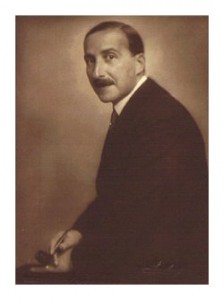
Stefan Zweig
(1881-1942)
Hand in Hand
Laß Deine Hand in meinen Händen,
Dort ruht sie weich und mild und gut,
Und leise rinnt ein Gabenspenden
Von meiner Glut in Deine Glut,
Bis sie nicht von einander scheiden
Was jede noch ihr eigen nennt.
Und dann verzehrend in den beiden
Ein einziger Gedanke brennt.
Stefan Zweig poetry
fleursdumal.nl magazine
More in: Archive Y-Z, Stefan Zweig, Zweig, Stefan
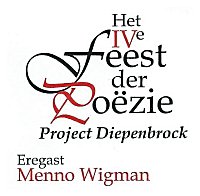 Het 4e Feest der Poëzie – Project Diepenbrock – zondagavond 23 november 2014 – CMA-Zaal, Amsterdam
Het 4e Feest der Poëzie – Project Diepenbrock – zondagavond 23 november 2014 – CMA-Zaal, Amsterdam
Menno Wigman ontvangt 1e exemplaar nieuwe editie handgemaakt poëzieperiodiek Avantgaerde met CD
Unieke, toegankelijke avond brengt jonge dichters en musici samen op het podium met gedichten op muziek
Project Diepenbrock
Deze 4e editie van het Feest der Poëzie heet ‘Project Diepenbrock’. Alphons Diepenbrock (1862 tot 1921) was een van de bekendste Nederlandse componisten van zijn tijd. Hij heeft veel gedichten van zijn tijdgenoten, zoals Willem Kloos, Lodewijk van Deyssel en Herman Gorter, getoonzet; deze prachtige liederen worden nu helaas nauwelijks meer uitgevoerd. Het Feest der Poëzie zet de Nederlandse liedtraditie voort door uit muziekbibliotheken het opgraven en uitvoeren van vergeten liederen op teksten van bekende Nederlandse dichters uit de late 19e en begin 20e eeuw.
Dit Feest der Poëzie maakt op een unieke manier de verbinding tussen heden en verleden: verschillende musici en bands hebben gedichten uit de nieuwe, 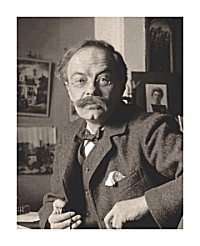 op het Feest te presenteren editie van handgemaakt poëzieperiodiek Avantgaerde te getoonzet. Deze komen samen met voordrachten door de dichters zelf op een CD die bijgevoegd wordt aan Avantgaerde, en gaan in première op de avond zelf. Daarnaast hebben de musici door Diepenbrock getoonzette gedichten opnieuw op muziek gezet en beleven we die avond ook daarvan de eerste uitvoering.
op het Feest te presenteren editie van handgemaakt poëzieperiodiek Avantgaerde te getoonzet. Deze komen samen met voordrachten door de dichters zelf op een CD die bijgevoegd wordt aan Avantgaerde, en gaan in première op de avond zelf. Daarnaast hebben de musici door Diepenbrock getoonzette gedichten opnieuw op muziek gezet en beleven we die avond ook daarvan de eerste uitvoering.
Programma: Menno Wigman, jonge musici en dichters
Eregast is voormalig stadsdichter van Amsterdam en veelgelauwerde dichter, bloemlezer en essayist Menno Wigman, die eigen gedichten en een vertaling van Rainer Maria Rilke heeft bijgedragen aan de nieuwe Avantgaerde. Hij zal deze en andere gedichten uit eigen werk voordragen.
Muziek neemt tijdens deze editie van het Feest der Poëzie een centrale plaats in. Daarom treden, met nieuwe composities op gedichten uit Avantgaerde en ander eigen werk, op: Susanne Winkler (sopraan) en Daan van de Velde (pianist) met een liedprogramma van de hand van componist Hinse Mutter; chansontrio En Vrac met bekende chansons en eigentijdse theaterliederen; en eclectische rockband Forty Dollar Baby met een bijzondere mengeling van vele instrumenten, klanken en teksten.
Ook de dichters van Avantgaerde Mieke van Zonneveld (winnares Turing Poëzieprijs 2014), Lennard van Rij en Simon Mulder ook voordragen uit hun 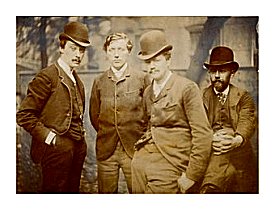 bijdrage aan de nieuwe Avantgaerde.
bijdrage aan de nieuwe Avantgaerde.
Verder kunt u een presentatie verwachten van Muze Poëzie-app.
De CMA-Zaal: decadent industrieel theater
Dit alles in de CMA-Zaal in Amsterdam-Oost; een oude fabriekshal van de Oostergasfabriek, industriëel erfgoed uit het einde van de negentiende eeuw, omgetoverd tot decadent theater met veel rode gordijnen, rood pluche, donker hout en een brandende haard. Tevens boekverkoop en signering.
Praktische informatie
Datum, tijd: 23 november 2014; zaal open: 19:45; aanvang: 20:15.
Entree: 11 euro/9 euro (kortingstarief: scholier/student/CJP/Stadspas/65+/donateur)
Locatie: CMA-zaal, Paradijsplein 1, Amsterdam (bij station Amsterdam Muiderpoort)
Reserveren is niet noodzakelijk, maar wel gewenst en mogelijk via de website www.feestderpoezie.nl.
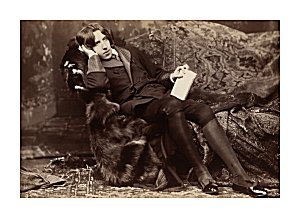 Rondom het Feest der Poëzie: een serie workshops over dicht- en voordrachtskunst
Rondom het Feest der Poëzie: een serie workshops over dicht- en voordrachtskunst
Rondom het Feest der Poëzie kunt u deelnemen aan een serie workshops rondom gedichten lezen, schrijven en voordragen, interessant voor iedereen die zich in de poëzie begeeft of wil begeven: jong dichttalent, gevorderde poëzie-lezers en zeker ook iedereen die voor het eerst wil kennismaken met de dichtkunst.
Locatie: Huis de Pinto, Sint Antoniesbreestraat 69, Amsterdam
Datum/Tijd: zaterdag 15, 22 en 29 november, 14:00 – 16:30 uur
Prijs: 10,- euro (betaling ter plekke)(studenten/65+/CJP/Stadspas: 7,- euro)
Passepartout: 25,- euro (studenten/65+CJP/Stadspas: 16,- euro) (betaling bij 1e workshop)
Inschrijven: info@feestderpoezie.nl
Maximaal 7 deelnemers per workshop.
– Jos Versteegen, dichter, liedschrijver en schrijfdocent, geeft een workshop over het schrijven van poëzie naar aanleiding van zijn boek De bliksem in je pen. Muzikaliteit en emoties in je werk brengen en beeldend schrijven zijn enkele van de onderwerpen die aan bod zullen komen op zaterdagmiddag 15 november, 14:00-16:30 uur.
– Simon Mulder, dichter, voordrachts-kunstenaar en docent klassieke talen, geeft een workshop voordrachtskunst. Met verschillende benaderingen en technieken leert u uw gedichten en/of die van door u bewonderde dichters over te brengen op uw publiek, op zaterdagmiddag 22 november, 14:00 uur-17:00 uur. De workshop wordt afgesloten met een openbare voordracht in de Leeszaal.
– Wilt u lezend en schrijvend kennismaken met de vormvaste dichtkunst (gedichten met een vast metrum en rijmschema) van Klassieke Oudheid tot nu)? Dan geeft Simon Mulder u een interessante introductie in de ambachtelijke kant van de dichtkunst, waarbij u ook zelf aan de slag gaat, op zaterdagmiddag 29 november, 14:00-16:30 uur
# Meer info website Feest der Poëzie
fleursdumal.nl magazine
More in: Art & Literature News, Feest der Poëzie, Gorter, Herman, Kloos, Willem, Literary Events, Lodewijk van Deyssel, THEATRE, Wigman, Menno, Wilde, Oscar
bert
bevers
Een weelderig notenjaar
Best vroeg is het nog, maar ooft is hier
en daar reeds sijp. De boswachter volgt
door het kreupelhout een spoor dat verre
van overwoekerd is. Hazengrauw aarzelt
de ochtend. Grenzen zijn afspraken. Zie
de springbalsemien, kijk naar de vogels.
Niets trekken zij zich er van aan: meesjes
passeren zonder wachtwoord. In een aai
en een draai is het weer winter, weet hij.
Bert Bevers
Ongepubliceerd, uit de reeks in wording Gedichten uit een stadje in de heuvels
fleursdumal.nl magazine
More in: Archive A-B, Bevers, Bert
Presentatie dic htbundel ‘Nader en Onverklaard’
htbundel ‘Nader en Onverklaard’
Dichter – schilder Niels Landstra (o.a. winnaar Poetry Slam Utrecht, jl. 9 november) presenteert op 20 november 2014 zijn derde gedichtenbundel ‘Nader en Onverklaard’.
Niels Landstra werd in november 1966 geboren in Slikkerveer, maar groeide vanaf de vroege jaren zeventig op in Noord-Brabant, in een klein dorp, met het vergezicht van de Biesbosch op de horizon. Als jonge adolescent besloot hij om het dorpse leven achter zich te laten, en betrok hij een kamer, drie hoog achter in een studentenhuis. Toch ging zijn reis verder. In Frankrijk, Oostenrijk en Hongarije, schreef hij romans, korte verhalen en gedichten, en keerde terug naar Nederland waar hij als artiest de bühne beklom.
Met de opvolger van zijn eerdere dichtbundels Waterval en Wreed het staren (uitgeverij Oorsprong), smeedt hij met zijn bloemrijke stijl versvorm, klank en ritme aaneen tot een geheel dat in zichzelf lijkt voort te stromen. Op haast tastbare wijze reikt hij de lezer aan hoe hij de schoonheid van de natuur en de soms schrijnende kwetsbaarheid van de mens ervaart. Landstra schildert met woorden en verbeeldt de wereld met een feilloos oog voor detail. Zijn penseel is pen en zijn pen is penseel. Deze bijzondere symbiose tussen gedicht en schilderij versterkt het gevoel dat hij in zijn werk legt.
In zijn nieuwe bundel is Landstra persoonlijker dan ooit. De nauwkeurige observaties van de ruimtelijkheid om hem heen hebben zijn waarneming versterkt en dichter bij zichzelf gebracht. Door zijn haast zintuiglijke beschrijvingen ontstaat een krachtig soort poëzie, doorvlochten met de zwierigheid van zijn eerdere gedichten.
Nader en Onverklaard maakt nieuwsgierig en daagt de lezer uit. Het verlangt naar aandacht en ontroert. Een schilderij van taal dat geen verklaring nodig heeft.
Aanvang 17.00 uur, Libris Boekhandel Buitelaar, Grote Markt 9, Breda
fleursdumal.nl magazine
More in: Archive K-L, Landstra, Niels
Thank you for reading Fleurs du Mal - magazine for art & literature